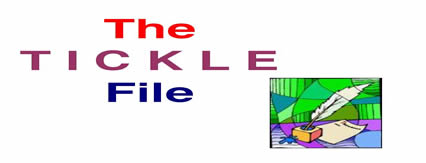
|
The Tickle File is ftm's daily column of media news, complimenting the feature articles on major media issues. Tickle File items point out media happenings, from the oh-so serious to the not-so serious, that should not escape notice...in a shorter, more informal format.
We are able to offer this new service thanks to the great response to our Media Sleuth project in which you, our readers, are contributing media information happening in your countries that have escaped the notice of the international media, or you are providing us information on covered events that others simply didn't know about. We invite more of you to become Media Sleuths. For more information click here. |
Hot topics click link for more
Investigative reporting, more often than not, involves tedious combing of various records, interviewing countless persons, tying one thing to the next then organizing it all into a report that illuminates an activity in the public interest. Occasionally, reporters catch a break; an important whistleblower comes forward. Every reporter of a certain age remembers “Deep Throat” of Watergate fame for steering Washington Post reporters Bob Woodward and Carl Bernstein to the corrupt practices of US president Richard Nixon.
Nearly 50 years later revelations from whistleblowers, in best practice confirmed by detail obsessive reporters, still shake the boots of the corrupt and corruptible. All too often, whistleblowers face the variously attributed adage “no good deed goes unpunished.” They are regularly fired from their jobs, often facing lawsuits and criminal prosecutions.
“Recent scandals such as Lux Leaks, Panama Papers and Football Leaks have helped to shine a light on the great precariousness that whistleblowers suffer today,” said French MEP Virginie Roziere, the primary force behind the EU Whistleblower Protection Directive, which passed the European Parliament (April 16) with overwhelming support. The legislation now passes to the Council of the European Union, which is expected to approve, before giving EU Member States two years for transposing into national law. (See more about investigative reporting here)
The Directive outlines a pathway for whistleblowers to first bring their information to the attention of employers or relevant government agencies. “The law explicitly prohibits reprisals and introduces safeguards to prevent the whistle-blower from being suspended, demoted and intimidated or facing other forms of retaliation,” said the EuroParl statement (April 16). “Those assisting whistle-blowers, such as facilitators, colleagues, relatives are also protected. In cases where no appropriate action was taken in response to the whistle-blower's initial report, or if they believe there is an imminent danger to the public interest or a risk of retaliation, the reporting person will still be protected if they choose to disclose information publicly.”
The EuroParl vote was taken days after Wikileaks founder Julian Assange, commonly associated with whistleblowers, was removed from the Ecuadorian Embassy in London for temporary residence in a British high security jail on a bail-jumping charge. In its earlier years Wikileaks uploaded and downloaded various inconvenient documents provided by whistleblowers. More recently, according to the report of US Special Council Robert Mueller, it acquired from agents associated with the Russian Federation and released same to the detriment of presidential candidate Hillary Clinton. Special Council Mueller said Julian Assange is “neither a whistleblower nor a journalist,” in his report for the US Department of Justice.
|


